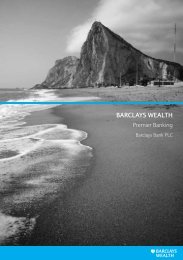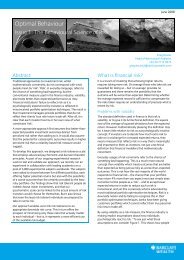BARCLAYS WEALTH ESTATES & TRUSTS
BARCLAYS WEALTH ESTATES & TRUSTS
BARCLAYS WEALTH ESTATES & TRUSTS
You also want an ePaper? Increase the reach of your titles
YUMPU automatically turns print PDFs into web optimized ePapers that Google loves.
Section 1<br />
Mirror will<br />
A will which contains almost identical terms to your will.<br />
Many spouses/partners have mirror wills in which they leave<br />
their estate to the same beneficiaries named in both wills to<br />
benefit on the death of the surviving spouse/partner. The<br />
survivor can however still change the terms of their will after<br />
the death of the first to pass away.<br />
Wills in expectation of marriage/civil partnership<br />
If you and your partner intend to get married soon your<br />
will(s) can be made ‘in expectation of your marriage’ which<br />
means it/they will be valid before and after the marriage<br />
takes place. Marriage would otherwise cancel a will. The<br />
same principle applies for partners intending to form a civil<br />
partnership.<br />
Foreign assets<br />
Unless you specify otherwise, your will is prepared to cover<br />
your worldwide assets and will cancel any other will (even<br />
one made to cover assets outside of England and Wales).<br />
However the law of the country in which the assets are<br />
situated may limit the effectiveness of any gift under your<br />
will. If you have assets outside England and Wales you<br />
should seek advice in the country where those assets are<br />
situated.<br />
If you already have a foreign will which is to remain in force<br />
or you are arranging for a foreign will to be prepared please<br />
fill in the details in Section 1 of the Will Instruction Form.<br />
The value of your estate<br />
Please tell us the value of your estate. If you have asked<br />
for mirror wills to be prepared, please show the combined<br />
value of your assets. The value does not need to be exact.<br />
An estimation of the band into which you believe the value<br />
of your estate will fall is sufficient. When giving the value<br />
please consider the following:<br />
1. Property owned jointly with any other person usually<br />
passes to the survivor on the first death, regardless of the<br />
terms of the will. If you wish to ensure that this does not<br />
happen and for the property to instead pass under your<br />
will you will need to change the way in which you own<br />
the property jointly. Otherwise assets in your sole name<br />
only will usually pass under the terms of your will.<br />
2. If you have a pension fund, depending on the type of<br />
pension arrangement, death benefits may either pass into<br />
your estate or be paid at the discretion of the pension<br />
fund trustees direct to your dependants. You should<br />
check with your pension provider how any benefits can<br />
be dealt with following your death.<br />
3. Life assurance policies, if written in trust, are payable to<br />
the person(s) named in the policy and not under your will.<br />
Section 3<br />
Executors and trustees<br />
Person or persons who will administer your estate on your<br />
death and will ensure that your wishes are carried out. You<br />
can choose up to four executors although two is normally<br />
enough, or one if you wish to appoint a professional<br />
executor. If you want to put money in a trust for children<br />
under 18, say, the executors/trustees will be responsible<br />
for managing this sum.<br />
Executors must be 18 or over and should be capable of dealing<br />
with complex issues. For this reason, we recommend a<br />
professional executor such as Barclays. See further details on<br />
page 4 of this brochure about the service Barclays provides.<br />
7


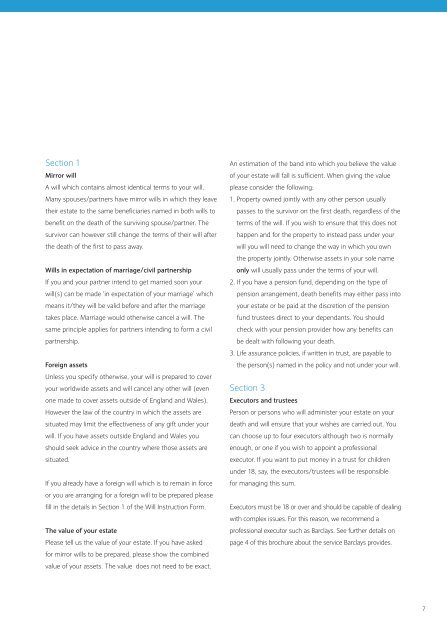
![PDF [0.9MB] - Barclays Wealth](https://img.yumpu.com/12809832/1/190x245/pdf-09mb-barclays-wealth.jpg?quality=85)


![PDF [0.7Mb] - Barclays Wealth](https://img.yumpu.com/12809769/1/190x245/pdf-07mb-barclays-wealth.jpg?quality=85)
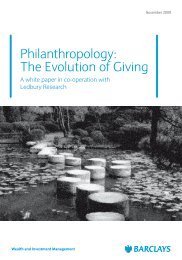


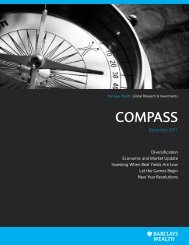

![PDF [2.8 MB] - Barclays Wealth](https://img.yumpu.com/12809647/1/190x245/pdf-28-mb-barclays-wealth.jpg?quality=85)

